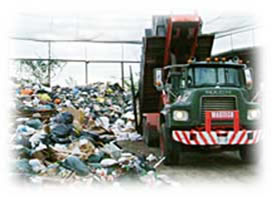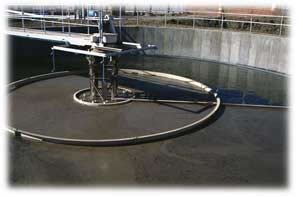
We supply a combination of engineering, chemicals and equipment to eliminate foul odours with proven solutions to cost-effectively control a wide range of unpleasant odours. Most of our products are non-hazardous, environmentally friendly and approved for use under certain conditions by Health Canada and the Canadian Food Inspection Agency.

|
|
|
|
|
|
|
|
|
Products
|

AirStreme™ automated misting systems and all-natural odour control solutions neutralize airborne odours instantly.
AirStreme™ Odour Control
Applications
Nuisance odours caused by airborne gases and particulate
pose a significant problem for municipal and industrial operators —
particularly for those active in solid and liquid waste management, composting,
and in a variety of manufacturing processes.
![]() Conventional
approaches, such as diverting odorous gases using high power fans, or
the use of localized deodorizing agents, are less than effective and often
pose associated health and safety issues for on-site personnel. HydraLogic's
solution utilizes our proprietary AirStreme™ misting systems and
formulations to neutralize malodours at their source — through a
combination of perimeter and directed spray atomization.
Conventional
approaches, such as diverting odorous gases using high power fans, or
the use of localized deodorizing agents, are less than effective and often
pose associated health and safety issues for on-site personnel. HydraLogic's
solution utilizes our proprietary AirStreme™ misting systems and
formulations to neutralize malodours at their source — through a
combination of perimeter and directed spray atomization.
This cost-effective strategy not only improves on-site working conditions
and worker safety, but also has been found to greatly reduce the frequency
of odour complaints from surrounding residents and businesses.
HydraLogic Solutions for The Food Processing Industry
 Food
Processors compete in an industry where soaring capital costs, labour
costs, compliance costs, together with market-driven commodity pricing
continually squeeze profitability. HydraLogic's innovative products and
technologies can provide much needed relief.
Food
Processors compete in an industry where soaring capital costs, labour
costs, compliance costs, together with market-driven commodity pricing
continually squeeze profitability. HydraLogic's innovative products and
technologies can provide much needed relief.
We help lower operating costs while enhancing worker productivity through
improved workplace conditions. Our BioStreme™ products assist in
odour control and in a broad range of issues related to disposal of organic
wastes. Our AirStreme™ line provides leading-edge solutions for
storage area odour control, flying insect control, and local area humidification.
Our innovative solutions provide impressive cost-benefits, without necessitating
any substantive changes to your current production processes. Not only
can we drive profitability, but you also realize the added benefit of
improved community and customer relations due to onsite odour reduction.
Transfer Station Operator Manages Odours At Tipping Pad Entrance

Malodours generated from the hauling and processing of solid waste at
an Ontario, Canada, Municipal Sanitary Landfill operation had been a continuing
source of complaints from neighbouring residences and businesses.
Sanitary Landfill Operator Satisfies Neighbours' Concerns About Malodours During Peak Operations
 Persistent
odour complaints by neighbouring recreational facilities prompted an Ontario,
Canada, Municipal Sanitary Landfill operator to try the AirStreme™
solution after previous attempts to divert odorous gases using high power
fans failed.
Persistent
odour complaints by neighbouring recreational facilities prompted an Ontario,
Canada, Municipal Sanitary Landfill operator to try the AirStreme™
solution after previous attempts to divert odorous gases using high power
fans failed.
The HydraLogic AirStreme™ application was designed to maximize contact
of our Piian Odour Neutralizer with malodorous gases, by strategically
mounting 61 misting nozzles along 1,400 linear feet of the site's perimeter
debris fencing. The AirStreme™ automated controller/pump drew the
dilute Piian formulation from a 500-gallon supply tank, mixed at a 1:500
water/Piian concentration. 13.75L per hour were dispensed at 30-second
intervals on a 5-minute cycle.
Plant management reported positive results, noting, "I can tell the
system is working and definitely helping with the odour problem. The smell
is very pleasant and the number of complaints has been greatly reduced."
Wastewater Treatment Plant Controls Odours Related To Hydrogen Sulphide and Mercaptan Release
 The
human ability to detect the presence of very low concentrations of airborne
hydrogen sulphide and mercaptans was a source of constant concern for
a Municipal Wastewater Plant operator in Ontario, Canada.
The
human ability to detect the presence of very low concentrations of airborne
hydrogen sulphide and mercaptans was a source of constant concern for
a Municipal Wastewater Plant operator in Ontario, Canada.
Frequent odour complaints, and generally unpleasant site conditions for
workers, prompted a comprehensive program that saw the installation of
AirStreme™ spray nozzles at work building entrances, interior spaces,
and above conveyors, augers, and grit/rag bins. A dilute solution of AirStreme™
HL 451 Odour Neutralizer was released into the airspace for 30-second
intervals on a 5-minute cycle, seven days a week during the operation
of the facility.
This approach not only met operator
and plant personnel requirements and expectations, but also has proven
more cost-effective than competing technologies that were ineffective
and suspect in terms of environmental.
AirStreme™ Efficacy Testing and Field Trials
 Animal
Cooling Trial: Dairy Farm, July 2003
Animal
Cooling Trial: Dairy Farm, July 2003
BioFilter Odour Reduction Trial: Chicken Processing
Facility, July 2003 – September 2004
Transfer Station Odour Reduction Trial: Transfer
Station, July 2003
Humidification Trial: Produce Warehouse, April 2003
Humidification Trial: Produce Warehouse, May 2003
© HLS Ecolo AB. All rights reserved